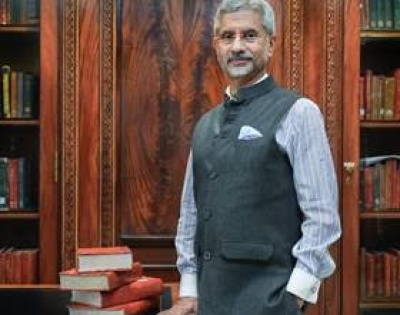'India will have to rethink its growth model in post-corona world' (Book Review)
By IANS | Published: September 9, 2020 05:20 PM2020-09-09T17:20:03+5:302020-09-09T17:30:15+5:30
New Delhi, Sep 9 Being shaped by the broad trends in the global environment caused by Covid-19, India ...

'India will have to rethink its growth model in post-corona world' (Book Review)
New Delhi, Sep 9 Being shaped by the broad trends in the global environment caused by Covid-19, India will have to rethink its growth model as following the "post-1991 mantras" makes "little sense" with a greater emphasis needed on self-reliance. This is all the more so in a scenario where plurilateralism will increasingly replace multilateralism, External Affairs Minister S. Jaishankar writes in his new book, "The India Way Strategies For An Uncertain World" that encompasses a wide canvas of issues.
"India too will be shaped by the broad trends in the global environment that the coronavirus will intensify. But more than that, it needs to take into account the more direct consequences of the pandemic. Its destructive impact naturally demands a strategy of national revival. And that, in turn, warrants a fundamental rethink about our growth model," he writes in the book, which has been published by HarperCollins.
This rethink was "probably coming anyway" given how much the current economic framework has "hollowed out" India's manufacturing capabilities. And, in the context of the free trade agreements, there is already an ongoing debate about the "adequacy of our preparations" to engage the global economy "more intensively".
It is also evident that many concerns "stemming from the policies of our partners" remain unaddressed. Thus, competing against those with structural advantages has been difficult as evidenced by India's growing trade deficit, Jaishankar writes.
"Going further down that very pathway without a course correction has obvious implications" as there are direct livelihood and social stability consequences and a revival strategy, therefore, needs to be chalked out "with the utmost deliberation".
As India has discovered in the past, economic strategies "have to be in consonance" with not only its own national situation but the global one as well and "if we are significantly out of step with the world, as we were in 1991, then they are difficult to sustain", Jaishankar maintains.
Three decades later, India's capabilities, competitiveness and trade are under stress, due to the post-1991 belief "that we could rely on the costing of others abroad to build our own businesses at home" had come at a high price.
A lowest bidder syndrome and obsessive quest for profit margins has ended up eroding domestic capabilities. Even more, the efficiency of others, instead of spurring competitiveness, has actually led to putting off further reforms.
"Openness abroad ironically has led to stagnation at home, discouraging innovation and killing creativity. MSMEs have borne the brunt of the damage" and while the pandemic may have brought out weaknesses pertaining to health security, "it has also exposed the larger strategic complacency", Jaishankar contends.
Whether it is unfair advantages that competitors enjoy or the lack of a level playing field, India needs to "predicate policies on realities rather than rhetoric. And the access we give and the arrangements that we enter into must take these into account".
If India is to take stock, "it could begin with the realisation that the world has been more protectionist than we expected" and "continuing to follow the post-1991-mantras in such circumstances makes little sense", Jaishankar says.
"Both national circumstances and
( With inputs from IANS )
Disclaimer: This post has been auto-published from an agency feed without any modifications to the text and has not been reviewed by an editor
Open in app